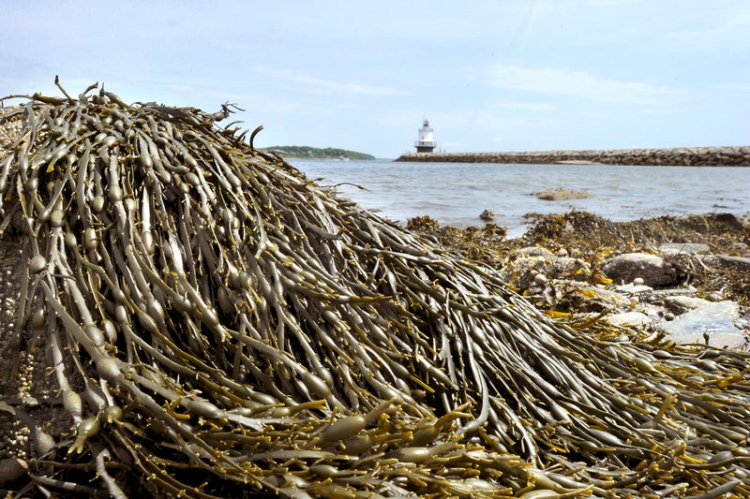Maine’s top court has ruled against a Canadian company that has been removing rockweed from the state’s coast for decades, saying the plant is on private property and can no longer be harvested without permission from the landowners.
The Supreme Judicial Court issued its decision Thursday, upholding a lower court’s ruling and siding with the property owners. The case could impact a growing industry in the state.
“We agree that rockweed in the intertidal zone belongs to the upland property owner and therefore is not public property, is not held in trust by the state for public use, and cannot be harvested by members of the public as a matter of right,” Justice Jeffrey Hjelm wrote in the majority opinion.
The state said it would review the decision to determine whether changes in state laws or regulations are needed.
“In the meantime, we will be reaching out to industry to indicate that any seaweed harvesting activity in the intertidal must be done with appropriate permissions from landowners whose deed includes the intertidal zone,” said Jeff Nichols, director of communications for the Maine Department of Marine Resources.
Acadian Seaplants said it planned to continue operations in Washington County and would seek permission from intertidal landowners where necessary.
“This is an extremely unfortunate decision for an entire industry and for Maine’s economy,”company President Jean-Paul Deveau said in a written statement. “The sustainable harvesting of rockweed has created jobs and grown businesses, all of which are creating sustainable and environmentally friendly products.”
Maine’s 143 licensed harvesters landed 22,436,544 pounds of seaweed in 2018 with a value of $921,818, Nichols said. A breakdown of the harvest wasn’t available Thursday, but Nichols said rockweed typically makes up roughly 95 percent of the seaweed landed.
Rockweed is a type of brown algae or seaweed that grows on hard surfaces such as rocks or dock pilings. Its fronds protect smaller organisms that live in the intertidal zone – the area between the high and low tide lines. It also contributes to water quality and provides a food source for nearby species.
The plant also has uses away from the water. Acadian Seaplants says on its website that processed rockweed is used to make fertilizer. Other products may include edible sea vegetables, brewing agents like Irish moss, ingredients for dietary supplements, cosmetics and personal care products.
Based in Nova Scotia, the company describes itself as a world leader in marine plant products, employing more than 350 people in 12 countries. The president’s written statement said most of Acadian Seaplants’ operations are in Washington County, where it has hired five full-time employees, as many as 30 seasonal hand harvesters and two year-round mechanical harvesters. Deveau also cited relationships with other Maine businesses and high schools.
“We have been part of Maine’s working waterfront for many years,” Deveau said. “We intend to continue to work in these communities, support local causes and invest in the local economy.”
In Maine, waterfront property owners own all the way to the low tide line. But state law allows the public to engage in acts of fishing, fowling and navigation in that intertidal zone.
Public access to the intertidal zone has long been disputed. The ruling acknowledged differing views among the justices on that issue, but they were united against rockweed harvesting without permission.
A central question in the legal dispute was whether rockweed harvesting falls into that category of fishing, but the justices rejected that argument.
“After arguing in its brief that ‘seaweed is a marine organism, not a terrestrial plant’ at oral argument, Acadian acknowledged that there is no legal distinction between plants growing in the soil in the intertidal zone and those growing on the rocks in that same area,” Hjelm wrote. “The fundamental dissimilarities between the harvesting of fish and of rockweed as a marine plant demonstrate that Acadian is not in the business of ‘fishing.'”
The plaintiffs, Kenneth W. Ross and Carl E. Ross, own coastal property on Cobscook Bay and Chandler Bay in Washington County and Roque Island Gardner Homestead Corp. The Ross brothers are Calais natives and live in Maine, their attorney said.
“We welcome this ruling and thank everyone who supported our case,” Kenneth Ross said in a statement emailed by his attorney, Gordon Smith of Verrill Dana in Portland. “We expect that most intertidal landowners will want to protect their rockweed. That is a wise investment for the future of the Maine coast.
“Fisheries, wildlife and the quality of life all depend on a healthy environment, but removing large amounts of habitat at the base of the food web will degrade the environment. That is an especially poor bargain when it is made for a handful of Maine jobs to produce fertilizer.”
In a 2013 report, the Department of Marine Resources and Maine Sea Grant, a University of Maine research program, estimated that the overall value of rockweed, after it has been processed into retail products, is in the vicinity of $20 million per year.
When the lower court originally ruled against Acadian Seaplants, a top state official expressed disappointment and the state later filed an amicus brief on behalf of the company during its appeal.
Megan Gray can be contacted at 791-6327 or at:
mgray@pressherald.com
Twitter: mainemegan
Send questions/comments to the editors.




Success. Please wait for the page to reload. If the page does not reload within 5 seconds, please refresh the page.
Enter your email and password to access comments.
Hi, to comment on stories you must . This profile is in addition to your subscription and website login.
Already have a commenting profile? .
Invalid username/password.
Please check your email to confirm and complete your registration.
Only subscribers are eligible to post comments. Please subscribe or login first for digital access. Here’s why.
Use the form below to reset your password. When you've submitted your account email, we will send an email with a reset code.